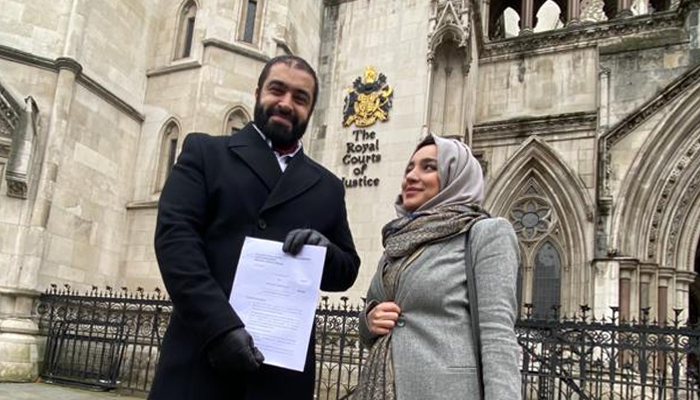Muslim academic wins Whatsapp defamation case at London High Court
The defamatory campaign against Abdulrazaq started when he said the mosque trustees were unelected
February 20, 2020

LONDON: A British Muslim academic has won a WhatsApp defamation claim at the London High Court against associates of the trustees of Exeter Mosque who admitted to defaming the academic through several social media posts branding him a “terrorist” and a member of Ikhwan ul Muslimoon (the Muslim Brotherhood).
At the High Court’s Queen’s Bench Division, Mohammed Nibras Hassan, the son of Shaheed Ul Hassan who is the head of Exeter Mosque, accepted that he had made baseless and damaging claims against Tallha Abdulrazaq, a well-known expert on Middle Eastern conflict, counterterrorism, and Daesh extremist.
A similar allegation of “extremism”, “violence”, and “sectarianism” against Abdulrazaq had been made in the summer of 2015 when he raised concerns regarding the lack of transparency at the Exeter Mosque. He filed that claim in January 2016 at the London High Court.
Hassan, who also goes by the name of Anas, called Abdulrazaq a "terrorist" and a member of the Muslim Brotherhood and said that the Brotherhood were "indirectly or directly related to terrorism" on a WhatsApp group that contained more than 100 participants.
Abdulrazaq launched his claim on the basis that he was neither a terrorist nor a member of the Muslim Brotherhood. He asked Hassan to apologise and retract his statement but Hassan refused and taunted him, believing that Abdulrazaq would not sue because he lacked the finances to hire expensive defamation lawyers.
Abdulrazaq instead embarked on suing as a litigant in person, conducting his own High Court claim against Mr Hassan’s legal team.
The defamatory campaign against Abdulrazaq, who is also President of the Exeter Muslims Association in the city of Exeter, started when he stated that the mosque trustees were unelected, and the secretary of the board and his family and friends have controlled the mosque since 1976.
It intensified following the key role he played in exposing the trustees’ links to an extremist cleric.
The trustees at the time were the secretary, Shaheed Ul Hassan, Mohammad Abdullah, Ahmad al-Jannati, Mohammad Saeid. According to a BBC report, Abdulrazaq’s father was also a trustee at the time and had been querying cash payments received from Sheikh Sadiq al-Ghariani in the region of £250,000. Abdulrazaq queried these payments and asked why cash payments were being received from suspect sources.
Within months, Abdulrazaq’s father was removed from the board of trustees without warning. The court papers maintained that Ghariani had offered public support to Al-Qaeda-linked extremist in Libya and supported radicalism and he was barred from entrance into the UK by the Home Office.
With assistance from the local community, Abdulrazaq helped guide an online campaign demanding answers from the trustees about these concerns and the lack of democracy and accountability in the governance of their mosque.
The trustees refused to answer questions but ultimately admitted to accepting money from Ghariani.
Abdulrazaq filed the court claim against Hassan not long after in early 2018. On October 29, 2019, Abdulrazaq succeeded in proving that Hassan had unambiguously meant to brand him a terrorist and wanted people to think he was a terrorist with violent tendencies.
Following the High Court victory, Abdulrazaq approached renowned defamation lawyer Mark Lewis of Patron Law who agreed to take his case on a no win, no fee basis on the basis of its strength and who successfully concluded settlement negotiations on his behalf.
At the Royal Courts of Justice on Wednesday, Hassan issued an unreserved apology to Abdulrazaq for any distress or embarrassment that the publication of the false allegations may have caused him and for any damage they may have been caused to his reputation.
Hassan also agreed to pay “substantial damages” to Abdulrazaq.
The open court statement said: “The Defendant acknowledges that these claims heard within the Exeter Mosque community about the Claimant are wholly untrue, false, and were published to cause the Claimant damage due to a dispute within the Exeter Mosque community. We therefore retract and withdraw these claims.”
Speaking to this correspondent, Tallha Abdulrazaq said: “I hope that this sad affair will now send a clear and unambiguous message that no matter how rich or powerful you may think you are or how poor and disadvantaged you think someone else is, you should never defame someone who has the capability and the will to defend his reputation vigorously. I pray that the wider Muslim community can now come together in the spirit of brotherhood and harmony to find a long-term resolution to these problems and to hold these unelected trustees to account for their actions that have caused nothing but divisions and questions about transparency and democratic governance at our mosque.”











